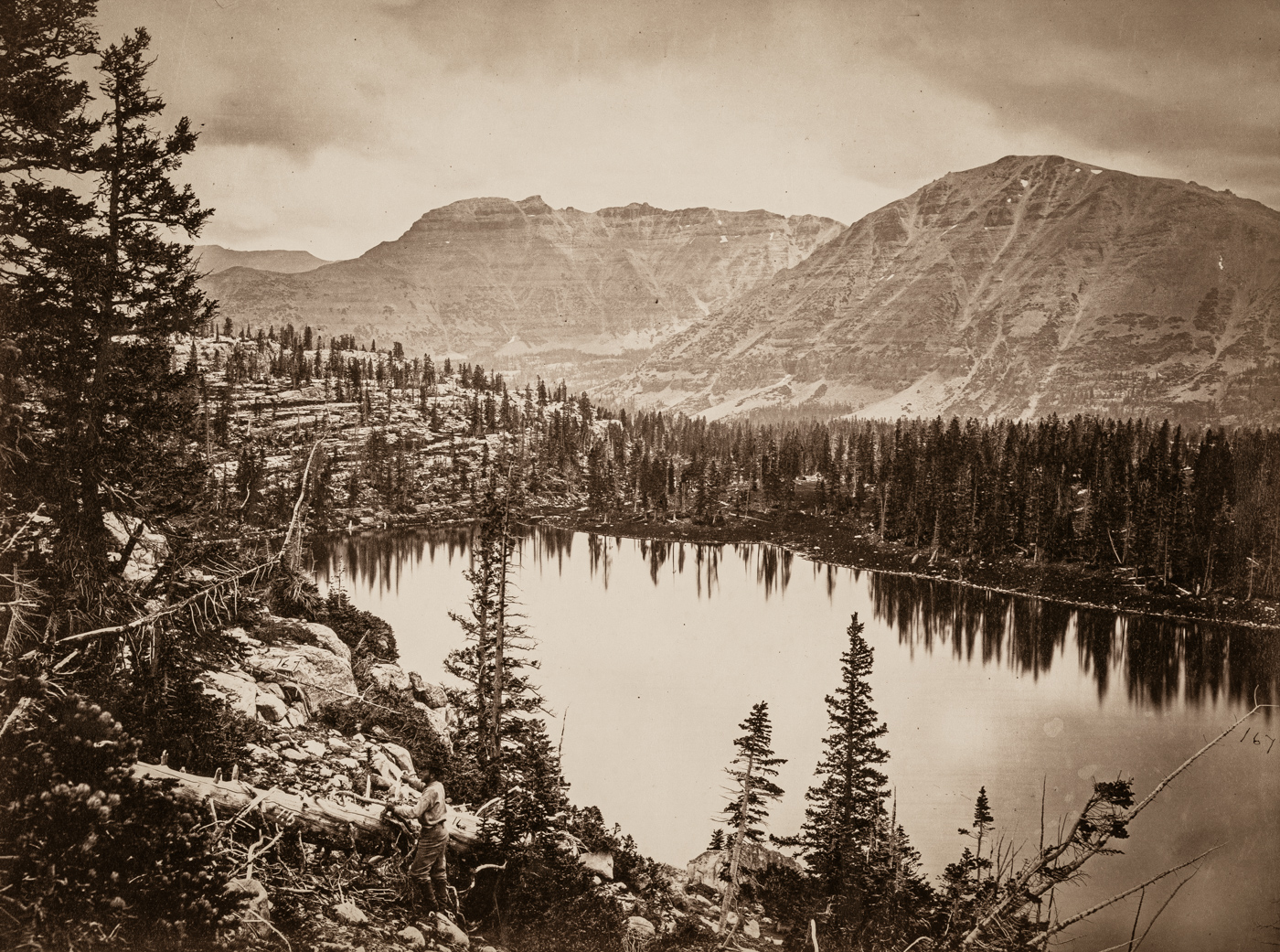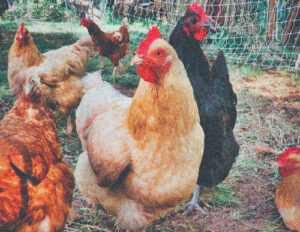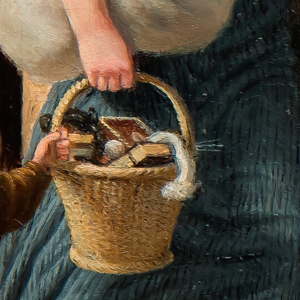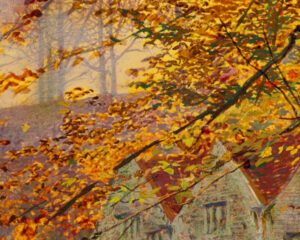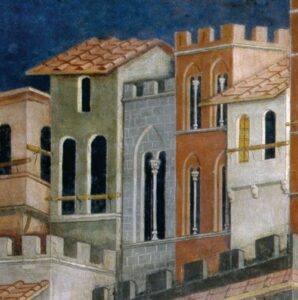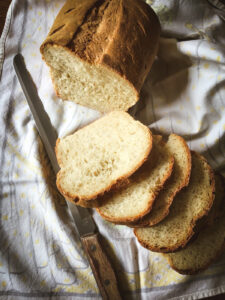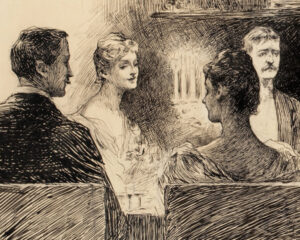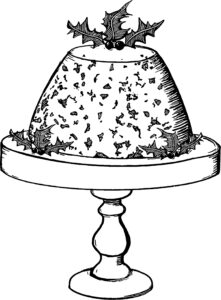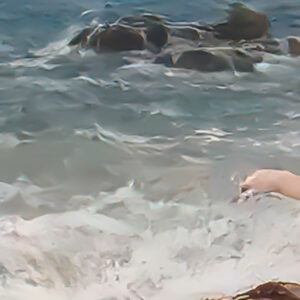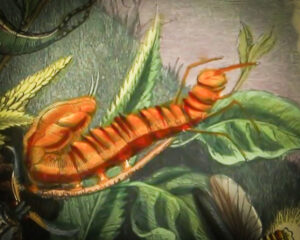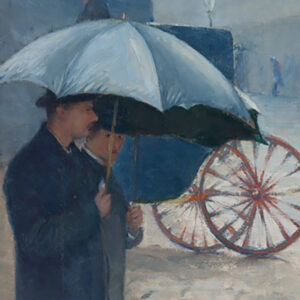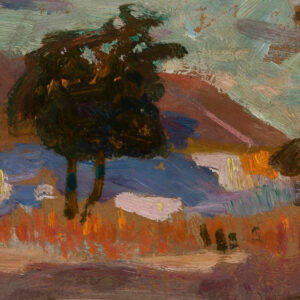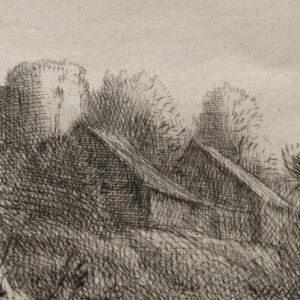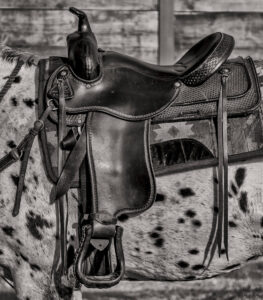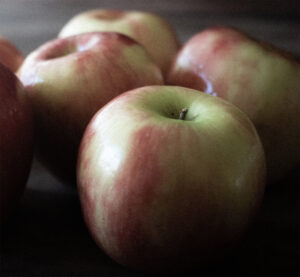Resolution

Dr. Jeff Gardner
Premium Subscribers
Sorry, this feature is only available for H&F Print Premium subscribers. You can sign up here.
(If you are already a Print Premium subscriber, be sure to click the authentication link you were sent by email so this won't happen again.)
It was shortly after midnight, January 1st, and I was sitting in a crowded pub with my wife and three sons. The band was blaring out something that I couldn’t catch; there was too much horn in the mix, and I had had too many Manhattans. As the obligatory exchange of resolutions went around our table, I turned to my sons and made a promise: Eight months from now, we would hike the Uinta Highline Trail, a one-hundred-an-ten-mile mountainous trek in northern Utah that never drops below ten thousand feet. Since our last trip together the previous summer through Rocky Mountain National Park, I had barely logged more than fifty miles on trail. Too much time in the office and several misplaced priorities had left me fifteen pounds overweight and badly out of shape.
I woke up early that same morning with a pounding headache, the kind that makes it hard to think straight, and rubbing my temples I wondered why I promised my sons that we would hike the Highline Trail. True, the trail is no trek to Everest Base Camp, but it’s not a country stroll either, especially for me, at almost sixty years old. I pushed these reasonable, age-appropriate doubts aside and leaned on the tired mantra of “What doesn’t kill you makes you stronger” to haul myself out of bed.
While my boys still slept, I sat outside on my deck and listened to the morning. I drank good black coffee and thought about the night’s promises, and then I thought about my father. I don’t like to think about my father. He was full to the brim with promises of trips never taken, things never done, and promises not to hit (again) my mother, my two brothers, or me. I reminded myself that I was not my father, and hurrying to my study, pulled out a collection of maps and began to plan the hike.
I enjoy thinking about these sorts of trips, but I have learned not to let “the thinking” become an event in itself, an end before things get underway. All the maps, the equipment, the reading, and the talk of “what if?” and “look here!” are alluring because they stir feelings of accomplishing something without having to shoulder the burden of actually doing anything. Planning, too, is seductive, an invitation to inaction through excessive contemplation. As maps and books and odd bits of gear piled up on my study floor, I wondered if this same seduction had lured my father into not doing so much of what he said he would do.
Over the next seven months, I fasted frequently and pushed myself to the gym five to six times weekly. The weight came off, and thanks to a series of shakedown hikes, I felt my trail legs again, solid and sure. By late summer, one month after the solstice when the mornings were still warm and muggy in our small, Midwestern city, I felt ready for the hike.
The morning of our departure was wonderful, the best of all mornings. In the early darkness, with the gear clean, organized, and packed, I didn’t think about all the work, the training, and the preparation. Instead, I enjoyed the intersection of potentiality and actuality, the “who we wish we were” becoming “who we are,” and the movement down the open road. I have learned to relish these moments because they do not come often. True, we pass through lesser intersections of potential and actual many times a day: I was potentially satiated but now I am actually eating a ham sandwich, but moments that matter, that move from us from where we are to where we hope we could be are rare, and we should savor them when they are served to us.
Starting on our long drive westward, moving across the Great Plains of Nebraska, I thought about all the souls who had traveled this now corn-covered expanse, from native peoples to my interloping European ancestors. So many of them who tried to cross the Plains never made it, and I can’t help but think about their bones that lay buried along the asphalt of I-80, only the latest in a succession of trails that have crisscrossed this land by the thousands.
So many of them who tried to cross the Plains never made it, and I can’t help but think about their bones that lay buried along the asphalt of I-80, only the latest in a succession of trails that have crisscrossed this land by the thousands.
I also think about my father. After my mother divorced him when I was about eight, he would come and pick me up on the weekends, and we would drive. My father, who rarely showed emotion except for anger, would not say much but instead spoke at me in one-line questions as he smoked, drove, and stared through the windshield of his old Dodge truck. Time with my father was strained and tense, and when I travel with my sons I deliberately fill the hours with music, food, and lots of conversation. I want them to feel how important they are to me and how much of the journey is the opportunity for us to be together, no matter the destination.
Only my youngest son was able to make the trip. My middle son had joined the Army and was enduring boot camp. And my eldest son declined the invitation the moment it was made. (To his credit, he did a long wilderness hike with his two brothers and me three years earlier. But this time around, when I proposed the trek, he said to me, “No thanks, Dad — I think I am more of an ‘Indoorsman.’”)
From our home in the Midwest to the heart of the West is an almost twelve-hour drive. But traveling with my youngest son is a joy. He is naturally good-natured, funny, and has a wit and sarcasm that makes even long trips pleasurable. As we approached Cheyenne, Wyoming, he turned to me and said, “Hey, Dad, do you know that they have an invention that lets you see through walls?” “No,” I answered, genuinely curious about this wondrous innovation. “Yeah, he replied, it’s called ‘windows.’” Got me again.
From Cheyenne, we drove west by southwest, through Evanston, Wyoming, to northeastern Utah. The plan was to park our van at the end of the trail, a place called Hayden Pass located on Utah Highway 150, and then catch a ride with an old friend to Chepeta Lake, which is situated about thirty miles into the trail and north of the city of Roosevelt, Utah.
The city of Roosevelt, population seven thousand, sits in the middle of the high Uintah desert. Stretching across the border of Wyoming and Utah, the Uintah desert is parched and vast, with a contrast of desert red rock and dry soil in the flat, running to shimmery aspen and fragrant, vanilla-like ponderosa pine trees higher up. It is rugged, stark, and beautiful, an alluring and dangerous landscape that sweeps out before you like an empty stage, an invitation to act out your wildest dreams and ambitions. But with little rain and only scrub cover across the lower elevations, it’s a deadly illusion, a desolate place that can kill. For centuries the native Utes of this land, who called themselves Nuche (“mountain people”), were not taken in by the high desert. When they acquired horses from the Spanish in the mid-seventeenth century, they resisted the temptation to strike out across the desert but continued, wisely, to stay close to the game-rich Uintah Mountains.
In the 1840s, Mormons arrived in the region and began displacing or converting the Ute and other natives, certain that “this was the place” God had set aside for them to erect a new kingdom on earth, a second Zion built on self-sacrifice and piety. The Mormons flourished in the well-watered valley, which is present-day Salt Lake City, but the red desert lands north and south of the Uinta Mountains were cruel, forcing them to either quit the land or suffer in silence, crying into the bottle or in solitude, or at times both.
My father was born and raised in Roosevelt, Utah. His parents were tough, no-nonsense folks who scratched out a living as farmers, raising him and his four siblings even tougher than they were. My father wore this toughness with an outward-facing pride, like his Dickies or mustache. He stood five-foot-nine, but he was a towering, frightening specter to me when I was a child. I was nervous when I knew he was watching me, even when I played. It seemed as if one misstep, one wrong word or especially tear could bring an explosive, anger-driven reprimand from him, often delivered with a kick from his steel-toed work boots or a rap on the head with a knuckled first, and always followed by a verbal lash of “Smooth move, Ex-lax!” or “There, now you have something to cry about!”
My father is buried in the Roosevelt City cemetery next to Highway 191, the city’s main drag. As we drove through town on our way to Chepeta Lake the thought of his mortal remains nearby frightened me, but I did not express my feelings to my son; I was too embarrassed and ashamed.
When we arrived at Chepeta Lake in the evening, a cold, misting rain fell across its icy, steel-grey surface. Forming a three-sided pocket around the lake, running east to west, the Uinta Mountains loomed over us. Despite it being August, the mountains were white-topped, leftovers from a two-hundred-plus percent snowfall the previous winter. The totality of the scene was imposing, and as I watched my friend drive away, I worried that despite months of preparation, my fifteen-year-old son and I may have bitten off more than either of us could chew.
The totality of the scene was imposing, and as I watched my friend drive away, I worried that despite months of preparation, my fifteen-year-old son and I may have bitten off more than either of us could chew.
We set up our camp on a small, flat spot among a tight stand of lodge-pole pine, with good cover from the wind and a view over the lake. Just below us, a troop of Boy Scouts was camped to one side of a large, open meadow. Soon, without being asked, my son was helping the younger Scouts chop wood and rig their fishing poles. Helping others comes naturally to my youngest son, and it is a joy to watch him. My father, too, I think, was at heart a helper but was often frustrated by not being able to communicate what he wanted to do for those he wanted to do it for. The resulting disconnect left him permanently annoyed, widening the gap between him and those he loved.
We had planned to stay at Chepeta Lake for two days to acclimatize to the altitude, but we stayed for four. I knew we needed to get started on the trail, but I loved watching my son do what he loved — fishing and playing with other boys. The delay was a deviation from our schedule that we would pay for in a few days.
Owing to the heavy snowfall, Chepeta Lake had flooded its banks and spread out and over the trail, and for the morning of the first day on trail we waded through shin-deep, freezing mud. Much of the Highline Trail runs across stretches of uneven, rock-strewn ground or straight down the middle of wet, muddy drainage basins that suck at your boots like thawing permafrost. Although not physically impossible, navigating the trail’s large sections of swamp meant we had to stop frequently, remove our boots, put on our water shoes, and repeat the process throughout the early morning. None of it, I knew from years of experience, boded well for what was to come, and after struggling for almost four miles, we tackled the first major obstacle of our trek, North Pole Pass.
North Pole Pass took us to school, or should I say, took me to school, and I dragged my son along for the lesson. The pass is over twelve thousand feet high, long and rounded, making it feel as if you are climbing without an end in sight. As you near the top, the trail is crowded with an impossible concentration of burnt umber and sienna-colored rocks, giving the landscape an unearthly feel, something like the surface of Mars. Although we started for the pass early in the morning, by 9 a.m. the weather was closing in, adding to the strain of the altitude and the weight of our fully-loaded packs.
Climbing up and over this towering hurdle from east to west, North Pole Pass contains several “false-summits,” flat areas that, on the climb up, look like the top of the pass but are not. They are merely plateaus before the true summit, which looms above your head. False summits are not uncommon in the mountains (nor in life), and they can deliver a psychological beat-down that is tougher on the body than climbing the pass. When you think you have reached the top, you realize you have just begun.
As we pushed for the true summit, I hung back as my son hiked in the lead. As I watched him, I noticed something was not right; his movements had become erratic, and for every three or four steps he took up the mountain, he inexplicably stopped or even walked one or one and a half steps back down, a strange, drunken-gyroscopic track. Earlier that morning he had said that he was “not feeling right,” and I worried that his disorientation was a sign of altitude sickness.
Altitude sickness, which comes from a lack of oxygen to the brain at high elevations, affects some climbers regardless of how experienced or physically fit they are. It can cause everything from loss of appetite to disorientation to fluid in the lungs or deadly swelling of the brain. Extremely fit climbers, some as young as seventeen, have died from altitude sickness while hiking the Highline Trail. The only cure for altitude sickness is to descend to a lower altitude. I knew I must get us up, over, and down the other side of the pass as soon as possible.
When I reached my son, he stood, shaking and pale at the top of the pass, leaning hard into the wind that blasted him from the other side of the mountain. We were completely exposed with only rocks under our feet (we left all vegetation behind some two thousand feet ago) and dark, heavy clouds gathering overhead. And then he began vomiting, a worsening of his altitude sickness. I hastily constructed a wind-break by holding our packs together and huddled next to the ground with my son. I gave him a Zofran tablet from the first-aid kit (to stop the vomiting) and sips of my water. We passed my water bottle back and forth, watching the weather like two anxious sailors in a lonely crow’s nest.
While we are on trail, my youngest son and I will often share water bottles, plates of food, tubes of lip balm, and other personal items that we would never dream of sharing when we are at home. A bond grows between us when we hike, one that makes such sharing second nature. I recall, for example, one particular hike — the day was blazing hot — and I was suffering from dehydration; I asked him if he had any gum. Without breaking stride, he took the piece from his mouth that he was chewing, pulled it in two, and gave half to me. Not thinking anything of it, I gratefully accepted it and was thankful for the relief. I realize that this level of sharing sounds primitive and uncouth, but that is not how I see it. Although I won’t use his toothbrush anytime soon, I cherish this closeness with one of my sons; it gives me great comfort. It also makes me feel — well, loved. It is a closeness that I never had with my father. There was such a distance between us that I would not have shared a glass of water with him, let alone my thoughts or feelings.
Thankfully, my son’s symptoms calmed, and we got down the other side of the pass. Making camp in the rain at Fox Lake some four miles later, I set up the tent on the edge of the trees and put my son into his sleeping bag. As he drifted off to sleep, I took on all of the post-hike work that comes with any wilderness trek. I filtered water, covered the gear, and cooked dinner over our small camp stove while my son slept. Waking him up when it was time to eat, he thanked me profusely for the bowl of hot food and all the work, but the pleasure was mine: It is a joy to care for him. When our children are young and small, it is so simple to be useful, to be the hero of their daily story. When they get older, and we are of less and less use to them, there is an emptiness that opens in us, a place that we want to fill up, to go back to, but we can’t — and both prudence and wisdom tell us that we shouldn’t try. Part of our children’s growing up is learning to hike their own hikes through life, a process that does not work well when a parent is hovering about.
When they get older, and we are of less and less use to them, there is an emptiness that opens in us, a place that we want to fill up, to go back to, but we can’t — and both prudence and wisdom tell us that we shouldn’t try.
My father was a hoverer, constantly watching what we were doing, then angrily and disapprovingly slapping our hands or taking the tools away and doing the job himself. I know that he wanted to help us, my two brothers and me, and show us how something should be done right. Still, the overall effect of his abrupt and angry interventions was the opposite: We were left uncertain about ourselves and our abilities to figure out life’s many little problems and tasks. In his later years, my father tried very hard to apologize for all the physical, verbal, and emotional violence. By the time he came around I was so negatively conditioned by him, like a dog that has been repeatedly beaten, that whenever he extended a helping hand to me, I would involuntarily pull back, physically and emotionally. This hurt him, I know, and though I did not take any pleasure in it, I just could not seem to act any differently.
The morning after North Pole Pass my son awoke feeling slightly better. While the dawn was clear over Fox Lake, the air smelled wet and heavy with expected rain. Following the previous night’s storm, the trail was a strength-sapping mixture of mud and isolated stretches of barren rock, and we spent the first hours of the day slipping, stumbling, and fighting for balance. By 10 a.m., the weather had again turned dark. By 11 a.m., it was sleeting heavily, and the temperature had dropped below thirty-two degrees Fahrenheit. As we hiked, struggling to make Kidney Lakes only four miles from Fox Lake, we were blasted by heavy, freezing rain, the kind you cannot shake off and shouldn’t hike through. We pushed on, much longer than we should, until it was clear that the storm would not break — our rain gear was soaked through, and we were dangerously cold. We cut the day short and made a poor camp just off the trail on a sloping, rocky hill. We scrambled to get the tent up, and I got my son inside; he was still weak from the previous day.
Moving as fast as I could, I tried to get the gear covered and find something for dinner. As I worked, I could feel myself moving more slowly, and buckling and unbuckling the packs was a major effort for my freezing hands. I began to shiver, and I felt confused, not being able to work out where things were in the packs or if I had taken something out or not. Then I began to lose track of time, and I was unsure how long I had been trying to get things together at our camp. I suspected that we were somewhere past Kidney Lakes and that we had missed the side trail in the storm, but in my deteriorating state, I was not sure.
And then my teeth began to chatter, hard and loud. Tightly clamping my mouth shut did not stop them. In contrast to the thousands of hours and hundreds of miles I have spent confidently on trail, at that moment, I felt lost. At that moment, I was afraid. I had just enough presence of mind left to know that I had to get warm immediately and not after I had sorted through the gear and food. I crawled into the tent, soaking wet and shivering violently, and I could see from the look on my son’s face that I was not doing well. He took control of the situation without asking, a reversal of the day before when I cared for him.
He undressed me (my fingers had stopped working) and got me into my sleeping bag, naked and shivering. “I got you, Dad, I got you,” he told me repeatedly, speaking clearly and calmly through the noise of the wind and rain violently thrashing our tent. Moving quickly, he ensured that I was securely tucked into my bag and that my wet, feezing clothes were placed outside.
Did my son’s quick thinking and actions save my life at our little camp just off the Highline Trail? The question is difficult to answer because hypothermia is tricky: Many who are sure that they will not die from it do, and others who are certain that they will die don’t. But in caring for me and reassuring me, my son answered a question that all parents have but can never really ask: Do those we have loved and cared for, however imperfectly, love us enough to care for us when we cannot care for ourselves? When my father suffered a stroke shortly after his sixtieth birthday, he landed in a low-grade, low-income care center. I spoke with my uncle about how he was doing, and he told me that the experience humiliated and frightened my father. My uncle floated the idea that I might come out and visit my father, perhaps even stay and look after him. I don’t remember how I responded to my uncle’s suggestion, but I likely said something like, “yeah, sure.”
I did not visit my father; I did not take care of him. Although I should have felt sad, even perhaps pity for him, I did not feel much of anything. All the violence, the broken promises, and the hurt had opened a great valley between us that I could not cross. Even in the last ten years of his life, before his stroke, he would phone, sober and apologetic, asking if I could forgive him. I could not, and I don’t remember if I tried, but over our many conversations I reassured him, falsely, that all was forgiven while I continued to resent him, a cowardly failing on my part that hurts me to this day.
The next morning, our fifth, it was still raining, and getting colder. I realized that by lingering at Chepeta Lake, I had placed us right in the middle of a hellish storm cycle with no end in sight.
Despite the eight-month run-up to the trip, I decided that we should push with what strength we had left and get off the trail. The closest exit was over Gun Sight Pass and down to Henry’s Fork trailhead, a distance of eighteen hard miles. Trying to make Henry’s Fork was a gamble. And if we could make it, Henry’s Fork Trailhead was over one hundred miles from Hayden Pass, where we parked our van.
I worried about how we would get to our van, but I was more worried about pulling the plug on our trip. I worried my son might feel like I had broken my promise to him, resenting me for canceling an expedition he had prepared for as hard as I had. And then I thought about my father. I wondered if he, too, found himself caught between circumstances beyond his control. Circumstances that made it impossible for him to keep the promises he wanted to keep.
When did life push him too far? What storms caught him unaware and underprepared? When was he lost and afraid, having missed a turn in the trail he was so certain about? Did he get caught, with no one to help him, between the push and pull of actuality and potentiality, the unbearable tension between who he was and who he wanted to be? I will never know the answers to these questions because years before he died, I shut down, and though we spoke regularly, we never talked. I became as emotionally remote to him as he seemed to me when he was at his worst. I never told him that I loved him or that I was proud of him for breaking his addiction to alcohol and staying sober for the last decades of his life. My father had realized that he had taken many wrong turns in our relationship and spent the last of his life striving, straining, to get us back on track. By asking me, over and over, for my forgiveness, he had tried to haul us both up and out of a broken emotional landscape.
As we hiked up and over Gunsight Pass, my son took the lead, encouraging me all the way to the top. I wondered how I would make the pass, feeling emotionally and physically exhausted from the weight in my chest much heavier than the pack on my back.
In a tremendous stroke of luck, as we crested the pass, we met a couple of day hikers heading to the Henry’s Fork trailhead. They offered to drive us to our van if we could reach the trailhead at roughly the same time as they did. They were moving much lighter and faster than we were, and as they pulled ahead, we pounded out nearly ten miles of hard, fast hiking to keep up. The strain cost me a few toenails and temporary nerve damage in my left foot, the pound of flesh to be paid for my son and me.
As we closed in on the last hard miles of our longest and last day of the trip, and it was clear that we were going to make our rendezvous, I did not have the strength to hold in my thoughts or feelings. I told my son, over and over, how proud I was of him, how much I appreciated him taking care of me, how lucky I was to have him as a son, how much I loved him. He took it all in and said, “I love you too, Dad”; then, with his usual humor and good nature, he added, “But let’s save all the emotional stuff for when we get out of here, OK?” I replied, “Good plan, son, good plan.” I promised to save it, but not for too long. It was a promise that I kept.
